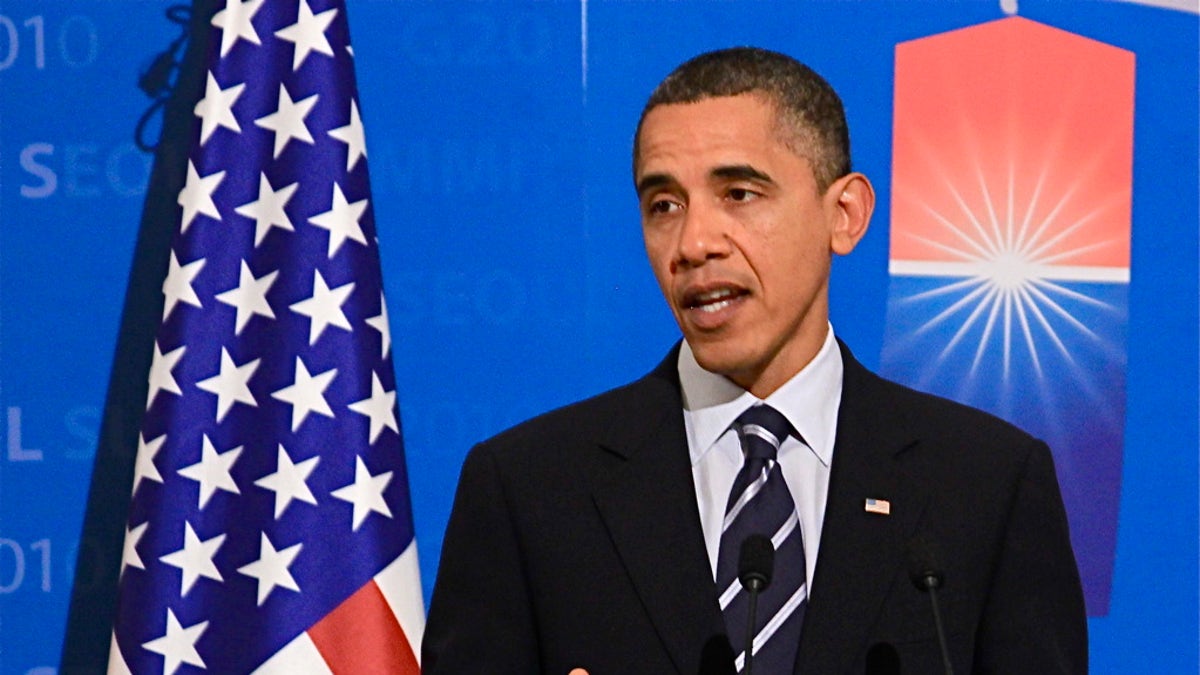
Fox News Photo/Ed Lewis
President Obama and Korean President Lee failed to reach agreement on the Korean Free Trade Agreement (FTA) before a joint press conference in Seoul Thursday, but both leaders said the two sides will continue to work towards a final consensus in the near future.
It was a blow to the Obama administration but the president told journalists gathered at "Blue House" - the Korean equivalent to the White House - that the Free Trade Agreement has the potential to be a "win-win" for both nations.
"We believe that such an agreement, if done right, can be a win-win for our people. It could be a win for the United States because it would increase the export of American goods by some $10 billion, and billions more in services, supporting more than 70,000 jobs back home. It could be a win for South Korea, with more access to the American economy, which would support jobs, raise living standards, and offer more choices for Korean consumers," Obama said.
Behind the scenes the two men spent 40 minutes in their one-on-one meeting trying to hammer out the FTA but according to Mike Froman, Deputy National Security Adviser for International Economic Affairs and United States Trade Representative Ron Kirk, autos and beef remained the two last sticking points. The U.S. wants Korea to open its markets to U.S. beef, previously banned after an outbreak of mad cow disease and for Korea to allow more U.S. manufactured cars to be sold in Korea.
While U.S. automakers sold $161 million worth of vehicles in 2009 in Korea, Korea's car companies led by Hyundai and Kia made $5.7 billion in 2009 in the United States, down roughly $2 million from 2008. But if the numbers seem impressive, they aren't, because cars made in the United States account for less than one percent of all automobile sales in South Korea.
U.S. officials said there have been "very productive" discussions over the past four days regarding the two issues, but that it was obvious there wasn't going to be final agreement immediately. But Kirk said the lack of a deal was not a setback for the president.
"These are very tough agreements to get done. I'd like to think we're closer to the end. And the leadership that President Obama and President Lee have showed on this has been critical to getting here, Kirk told reporters. "But it became apparent that we weren't going to resolve all of these in the remaining hours. And I think President Obama and President Lee wisely made the decision to let's slow the process down but also keep a very tight time frame to conclude these over the next several weeks. So those are our marching orders."
Froman told reporters the two leaders decided with additional time the United States and Korea could reach a consensus on an agreement that could then be taken to Congress.
For his part, Lee asserted the FTA is not dead yet and said the relationship between the two nations is not a one-way street even if some American companies feel they cannot compete with the large South Korean companies.
"[T]he Korean products that you talked about -- the LG, Samsung, Huyandai cars and some of these products -- when you look at a cell phone made by the LG, the core technology and the goods that are used by these LG companies to build one single cell phone, most of them are imported goods or parts. And many of them come from the United States and other countries, so you cannot say that it is 100 percent Korean manufactured," Lee said.The original FTA, negotiated under the Bush administration has faced dissent by Labor Unions, Ford Motors and democratic politicians and has languished in Congress. In addition President Lee has faced political problems at home, which has made consent on the FTA difficult in South Korea as well. Over the summer in Toronto at the G8 summit, President Obama announced he hoped to have the FTA in place during the G20 meeting in Seoul.




